KATE AUSTIN – PINCHAPOO
KATE AUSTIN – A Preface
I first met Kate Austin at a charity golf day organised by financier and philanthropic horse owner Rupert Legh.
His wife had a mutual friend who knew of Kate’s tireless and embracing work with her self-created and personally driven charity Pinchapoo.
I was there with the larger than life character, horse owner, businessman and punting gambler Phil Sly. He was there to inspire the hackers to dig deep and support Legh’s designated beneficiaries for the day. Pinchapoo was one.
Phil had just come from a double shot of chemotherapy as he continued a stirringly fighting battle against “The Grub” (of cancer – he had it everywhere) as he called it.
“They gave me eight weeks to live six weeks ago,” thundered Phil as if delivering the coaches Grand Final address. “It’s just a number. They gave me six months to live six years ago.” Phil died two weeks later.
But his message resonated deeply. It still does. The demure Kate had the daunting task to follow Phil.
As she took the microphone, like the rest of us, she was shaking, not from fear, but from Phil’s raw inspiration, and message of survival and giving and doing.
Then she bravely gave her story (or part of it) anyway.
It is one of triumph over adversity, a destroyed family upbringing to a positive uplifting life that now changes those of so many others. Sound a touch clichéd?
Kate’s story is anything but. One listen and you are hooked on a tale as stirring and humanising as any you could possibly hear. But it can only be Kate’s story, and her message comes from a place so dark that inspiringly now shines a light that is so refulgent.
I wanted to find out more and share her story. She finally wanted it told -in all of its parts. This is Kate Austin’s story and I am privileged to share it.
Bruce Clark – October 2016.
KATE AUSTIN – This is her story, the journey to Pinchapoo
by Bruce Clark
Kate is just a teenager alone in the kitchen of her family’s suburban Melbourne home. But she’s not there to eat.
It seems her father’s temper is brewing (again), exploding into an uncontrollable and relentless physical and intimidating domestic rage against his own young daughter.
Kate is already battered and broken, but she manages to retreat to her bedroom, somehow on hands and knees seeking some form of refuge. Her father’s assault would continue.
She cries for help, is thrown against a wall, her breathing cut short. And he’s still not finished. But Kate thinks she is.
Her father picks up a chair with cast iron legs, raising it above his head with intent when from nowhere her brother appears stopping the assault and saving her life.
The day with that chair in her own father’s hands, she knew she was not only in desperate trouble, but in need of desperately immediate help. She rang a kid’s helpline for the reason “there was nowhere else to go”. The advice was obvious – “leave”.
But where would she go? And with what? It would be with just a toothbrush. Nothing else!
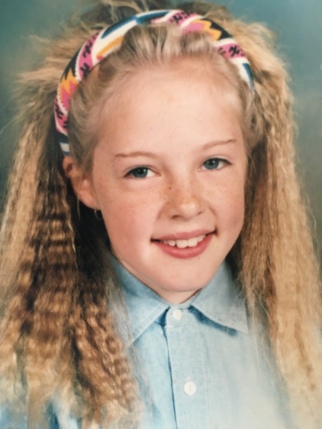
She didn’t know it at the time but the significance of that small item of personal hygiene, a toothbrush, would become a symbol of her past and more importantly would become one for her future and the birth of the life changing charity Pinchapoo.
But why take that toothbrush in the maddening scare of a rapid and frightening departure?
“I didn’t know it then but my instinct kicked in, I knew I needed to feel human at the other end, not that I knew where that would be,” Kate said.
And though it would be years later and that light bulb moment in a shower that officially birthed Pinchapoo, Kate now understands what happened then and why her charity is changing the lives of so many in need of or unable to get hygiene products.
“I realised the extraordinary effect those items I took for granted in my bathroom, had on me and my ability to interact, connect and contribute to the world.
“Without them I couldn’t. I never wanted another soul to feel like I did during the time due to something as seemingly as simple as hygiene- what I believe is a basic human right,” Kate said.
So when Kate left home, trying to break the cycle of abuse, walking 10km in the rain with her first boyfriend whose family would take her in and care for her, provide $5 for tuck shop the next day at school, Kate was still in the same clothes and underwear.
“It was the worst night of my life. I had no deodorant, no clean clothing, I went from being the happy kid who sang in a band and enjoyed school to a nobody with no self esteem,” she said.
“I wanted to dig a hole and die, I just didn’t want to see anybody. I never knew that you could cry as many tears as I did. I can still feel the burning of my eyes to this day.”
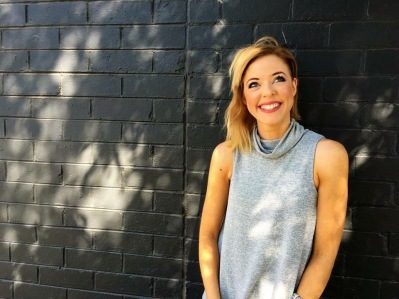
There is a line in fabled writer Graham Greene’s 1940’s epic “The Power And The Glory” that goes “there is always one moment in childhood when the door opens and lets the future in.”
For Kate that moment was then (but it could have numbered any in an upbringing of wildly outrageous behaviour from her parents).
Kate clearly recalls a dominating mother wearing the pants at home, a loud bold brash abrasive woman, while her overtly quiet and introverted father would be the instigator of physical damage while her mother would do the emotional.
Try this:
Her mother hanging Kate’s dirty underwear on the back door to humiliate her in front of friends, the insinuation she was promiscuous (“a slut”) and then attempting to seduce her daughter’s own boyfriend while she was locked in her own bedroom.
Or her mother charging rent as another form of control. Kate worked as a “checkout chick” (“and I loved it”) earning an hourly rate but not enough at times to meet her mother’s weekly demands, which meant being evicted from the family home. She was always under threat or notice. Or at best being forced to sit outside eating dinner with the family dog. Kate hated the dark.
Or perhaps worst of all (if possible), expressing that she wished Kate, born in a double breach position, should had been “aborted” – something raised often especially late at night again when Kate was locked away while her boyfriend was getting that unwanted affection from her own mother.
Kate still wonders if her childhood was always that way. She only has to look into the mirror each day to know it virtually was.
“I have some memories of Christmas holidays at Echuca, riding bikes, playing cricket and yabbying and that sort of stuff but then I look at my lip every day when I am putting on my make-up and see the scar. I did that when I was four years old,” Kate said.
Maybe starved of attention, or just hoping her mother might want to engage, but it was to be Kate’s first self-harm when all she perhaps wanted was a mother’s reaction. So Kate used scissors to cut her own lips, as a four-year-old, and the scars remain today and forever.
The internal torment of then would crescendo into suicidal thoughts in adult life and eventually into medicated long term treatment for mental illness, still to this day.
And while Kate found nothing in her own parents, her constant was, and still is always, her grandparents, Ma and Pop.
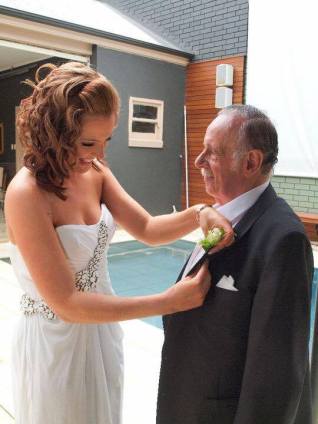
In one of her darkest moments she would write them a letter outlining the horrors of her life in the family home. To this day it remains unsent.
But in it she would write: “Know that I protected you from this hurt because to see your world be turned upside down would have been the greatest hurt of all for me. It was always a burden I was willing to bare for you.”
Kate recalls a grandparent’s house that she could only have dreamed of in her own home.
“There was so much love in their house. All I wanted to be was a doctor and we would wrap Pop up head-to-toe in bandages all the time,” Kate said.
“The other thing was we’d play Alice In Wonderland and yell in our best regal voices “off with your heads” or something like that,” she said.
“My first memory though is of a pink and orange apron, it was so much of the time,” she said.
And there would be grandmother’s wedding dress to try on and live like a king and queen with them – having normal fun and engagement.
These are memories still cherished from youth for Kate, but before too long they would be ripped away by her parents again.
And it got worse when a bureaucratic social worker said Kate’s situation didn’t fit into one of their “categories” and she was coaxed back again to the family home for one last chance.
“My mother told me she was going to commit suicide if I didn’t come home,” Kate said.
“When things settled a little – I agreed to come back if we could see a family physiologist. We did one session and privately he urgently told me to leave as quickly as I could.”
Kate could have easily descended into a life of drugs or alcohol or just the darker side of life, but kept at school, graduated, maintained her passion for singing and would eventually get into the world of advertising and marketing.
She would meet Dean at work, marry and mother two boys, loved so much she says in her ebullient ways “I want to eat them”, but that too a nod to a family past she may have herself craved.
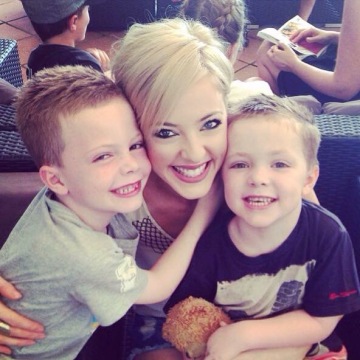
She would establish the ‘cheeky charity” Pinchapoo, be nominated for Australian of The Year, and shine an indefatigable refulgent spirit on her life and work, that should have made any parent proud. Except her own!
Kate’s parents never wanted this story told. But then nor did Kate – until now.
“Every time I tried to write or tell my story before, I would pull back, maybe I was looking to protect myself or my family, I just wasn’t ready.
“I think at the time it was just too confronting even for me, but now the story has a greater purpose, I’ve been able to use the pain to fuel change, the story now is much bigger than me, even though it is mine, it can now be everybody’s.”
“This is the first time I’m happy to totally own my story and share it. I know my parents continue to be in total denial of their roles and the impact it had on my life, but I am no longer going to question myself about my childhood and all the pain.”
And that story became this story and the story of Pinchapoo.
“I can still remember standing in the shower when it hit me. I was using a hotel shampoo when I wondered how many other people pinched them and if we could use them to do some actual good,” Kate said.
The next minute Kate ran out of the shower naked yelling ‘Pinchapoo’ to Dean, who thought his wife had gone mad. He said to her “slow down, tell me what you are talking about.”
So why Pinchapoo: “It’s pinching hotel shampoos and toiletries – simple” she would say.
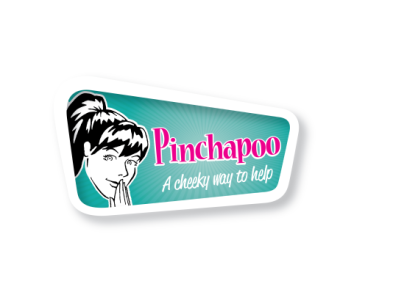
And with that this Robin Hood like movement was born and now some 900,000 hotel products later have been redistributed via 60 major national organisations to the needy in it seven years of operation.
Pinchapoo is now the largest total hygiene solution Not For Profit distributor in Australia.
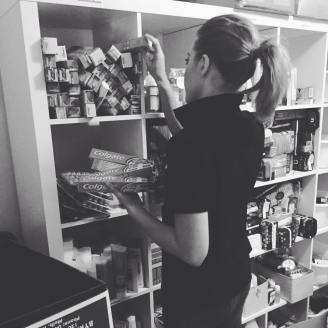
It works with homeless shelters, soup vans, family violence refuges, community shower programs, refugee support centres, short-term housing, crisis accommodation hospitals, and schools jails emergency relief efforts for bushfire and flood victims.
And all of this runs from Kate’s family home. As busy as any home with two kids might be, imagine dozens of volunteers descending at times repacking donated and pinched “Poo” products to then be distributed to those is need. It’s a mad house and Pinchapoo now needs a warehouse.
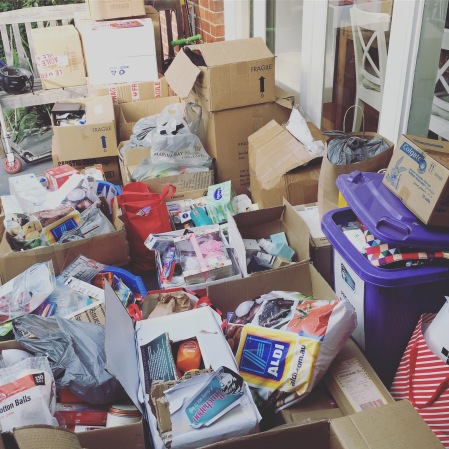
Add to that the expanding schools that is the latest Pinchapoo initiative and inspiration. The free “school support program’ is rolled out to 300 schools now as a tool for welfare coordinators to discretely support struggling children and families during tough times.
“There are 1 in 6 families in Australia that make the choice between food and hygiene every week. Together we can ensure children have this basic need met and can be happy healthy learners,” Kate said of the schools program
Kate does have a vision to take “Poo” to the world, but first Australia.
“The most incredibly empowering and rewarding part of the job is the mission to shift perception that all people need is a good feed and a roof over their head. That’s bullshit,” Kate said.
“Feeling good about ourselves is the first step in the journey of rehabilitation. So food is nutrition for the body but hygiene is the nutrition for the brain,” Kate said.
But Kate’s own brain has suffered from her life experiences and is an ongoing issue today.
Without knowing it for so long, Kate’s tireless work was hiding a history of mental abuse. And nothing in her vibrant, engaging, inspirational personality could mask deeper issues.
It wasn’t until this year that Kate sought medical advice and was diagnosed with a severe mental illness. How she managed to not only survive (barely) while build the charity and run a family is beyond any real comprehension.
“I was obviously in a bad place, I struggled not knowing how to handle myself, and there were endless anxiety attacks. I had been bailing these thoughts up for 15 years, it was entrenched in my make-up, and my escape was just keeping busy, it was my reason to keep going, not to let things defeat me,” she said.
“It got to a stage where I just couldn’t function, I was paralysed by the anxiety, I couldn’t breath, I’d be vomiting all day, my friends couldn’t see it happening, but it was the most horrific debilitating time of my life, I was engulfed in a battle I wasn’t able to win.”
But such issues are not “beaten” without help and that cry changed Kate’s life, well saved it actually.
From the abused child almost killed by her own parents, Kate eventually got to the stage of taking her own life herself.
“I just wanted to top myself, I couldn’t fight my brain any longer, I was at war with myself the whole day, I was exhausted,” she said.
“I knew it just wasn’t about me any more, it was about the kids possibly losing their mum, leaving them on their own. I didn’t know how I was going to do it but I knew I just couldn’t.”
To combat that mental illness Kate requires medication – and missing a day can lead to a horrible relapse into the dark spaces – but nothing will stop Kate channelling her indefatigable energy into a positive life.
“It took some adjusting at the start but it became so much easier to deal with after the diagnosis, you just can’t understand how terminal it seemed at the time.”
Today Kate, nominated for Australian of The Year in 2015, shares her experiences and advice with countless groups from schools to business leaders and is sought after to share the girl with the toothbrush story to the burgeoning charity work that is Pinchapoo and what it does.
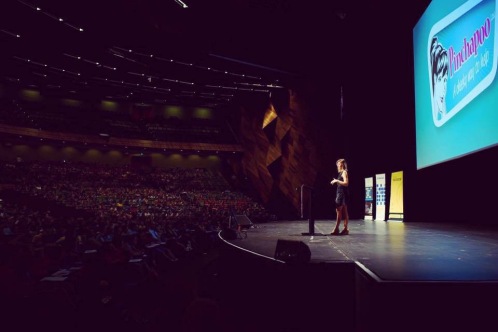
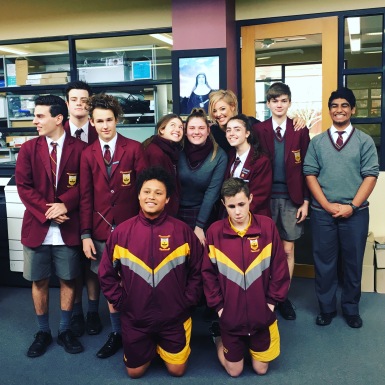
“This is not why we do it, we are unapologetic working in the space we do, we are working for other people every day. It is not about me or us, it is and always has been about what we do and what we can do and the opportunity to do it”.
Despite a daring attempt from her parents to re-engage in Kate’s life, she has maintained her steadfast independence to live a life of her own without them in her family existence.
Ma and Pop remain as close as ever to Kate’s family but they are also in contact with Kate’s parents.
She still hasn’t sent that letter but now shares her life story with all.
Kate downplays her role as the face of Pinchapoo.
“I’m no genius, I came from a stock standard education but my life education has taught me to become fearless and focussed, mine is just that face that resonates what Pinchapoo is about as we ride this journey of life,” she says.
But from that and the challenge of surviving in life, the charity work that is Pinchapoo was born.
“And in my mind it won’t stop until every person in this country in need has access to personal hygiene and the dignity that it brings,” Kate said.
And it all started with Kate’s toothbrush.
*****************************
If you know of anyone who needs help: Lifeline 13 11 44
